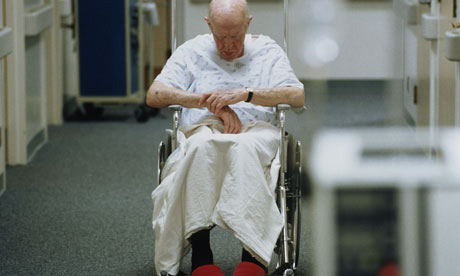
Say your mother gets dizzy and falls, so you take her to the hospital where she puts on a gown, lies in a hospital bed, eats hospital food and is attended to by nurses and doctors. She could access the same services as admitted patients, while technically not being considered "admitted" at all, costing her far more out of pocket. She might not even learn this occurred until she is packing to leave.
Hospitals consider patients to be in observation status when they are not well enough to go home, but not ill enough for admission. Seniors who receive hospital care are increasingly at risk of being relegated to what I like to call the hospital's "observation purgatory", where they can stay in a hospital bed for longer than 72 hours and not secure premium insurance coverage for expensive extended visits. This change in semantics can have dire consequences, depriving seniors of proper healthcare and leaving them and their families responsible for thousands of dollars of hospital bills. As a geriatrician with more than a decade of direct patient care, I have seen this happen repeatedly. I am disturbed by it, and I am certain it could affect you or someone you love.
This dangerous trend of relegating the elderly to observation purgatory is on the rise as healthcare costs and Medicare spending continue to soar. Many services and drugs patients assume are covered actually aren't for observed patients, and can cost them a fortune. Medicare Part D, which covers drugs and turns 10 years old this week, is not accessible to observed Medicare patients. Some 1.6 million Medicare beneficiaries were being "observed" nationally as of 2011. One study in the Journal of Health Affairs found a 34% increase in observed patients between 2007 and 2009. What this means is that Medicare's payment policies designed to rein in hospital admissions, and expanded even further under the Affordable Care Act, are likely exerting undue influence on hospitals to consider observation over admission more often.
An observation classification can even lead to acquisition of new medical problems, including bedsores, pneumonia, and overall decreased physical functioning, while subsequently denying patients coverage for therapy to undo the damage. The median time that a hospitalized, non-demented elderly patient spent out of bed standing or walking was 43 minutes, according to a study published in the Journal of the American Geriatrics Society in 2009.
Say a patient has been bedridden for several days and needs therapy to walk again. For admitted patients who have spent three straight days in the hospital within 30 days of admission, Medicare would pay for "tune up" care in a skilled nursing facility. Furthermore, Medicare would fully cover all expenses for patients for the first 20 days and would assess a reasonable daily co-payment up to day 100. However, for observation patients, skilled nursing care is not covered by Medicare. If categorized "observation", Medicare will not cover rehabilitation costs, even though the patient endured a hospital stay and was encouraged to rehabilitate in a skilled nursing facility by a physician. In a scenario as common as this one, an observation designation can potentially be deadly.
Worst of all, it seems hidden from view that it is happening. Hospitals follow murky Medicare guidelines to determine whether patients qualify for observation status. Many times, observation patients were found to have the exact same symptoms as admitted patients. However, their designation was affected by the hospital they chose, according to a recent investigation by the Department of Health and Human Services (pdf).
Determining whether a patient should be admitted or observed should occur within 24 to 48 hours, but it often does not – observations exceeding 24 hours nearly doubled between 2006 and 2011. Furthermore, patients can be placed in observation purgatory during any period of their hospital tenure, even retroactively. Additionally, patients must be notified of their designation prior to discharge from the hospital, but some don't get this notification until they're literally walking out the door.
Hospitals are concerned about costs, which contributes to observation purgatory designations. Medicare incentivizes hospitals to designate an increasing number of Medicare patients as observations by withholding a percentage of payment from hospitals with high readmission rates. Additionally, the centers for Medicare and Medicaid Services believe that penalizing hospitals that violate the 30-day readmission cap will improve the quality of care Medicare patients receive in their initial hospital stay. To be sure, hospitals don't have the last word. Auditors review patient records to determine whether or not a Medicare beneficiary was rightly admitted to the hospital; if an admission is deemed unnecessary on review, the hospital must pay Medicare.
What can patients and their advocates do about this? Ask for the hospital designation immediately, and advocate for a change to "admission", if the patient is in observation purgatory.
Hospitals should be more transparent as to how these designations are made, and should immediately notify patients and families of status or status change after initial emergency room workup. Physicians can thoughtfully and deliberately apply proper diagnostic codes to Medicare beneficiaries that ethically and medically justify their admission to the hospital. Medicare should count the time spent in observation toward the three-day stay requirement.
President Obama recently apologized for unexpected problems with the roll-out of the ACA. Congress should take a page out of the President's playbook and abolish observation purgatory. Your relative's life could depend on it.

